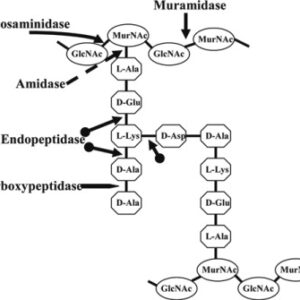Lactobacillus helveticus
Lactobacillus helveticus is an organism belonging to the group of lactic acid bacteria (LAB). It was first described in 1919 by Orla-Jensen, as an isolate from Emmental cheese. It can grow at a relatively high temperature of ∼55°C, and it is proteolytic. It has a Generally Recognized as Safe (GRAS) status. It displays particular features that are applicable in the dairy industry.
Lactobacillus helveticus is used in producing long-ripened Italian cheeses such as Gruyere, Emmental, Parmigiano Reggiano, and Grana Padano and Swiss-type cheeses. It is obtained from natural lactic starter cultures that are used in producing typical Italian cheese. During the making of cheese, Lb. helveticus leads to flavor development and acidification.
Lactobacillus helveticus is also gaining significance as a health-promoting bacterium in nutraceutic and probiotic food products. It has the potential to exert a synbiotic effect and produce bioactive peptides, in association with prebiotics in fermented dairy products. Lactobacillus helveticus is considered a multifunctional LAB with increasing significance in the food industry.
L. helveticus is used in producing fermented drinks such as Calpis and Evolus, which exhibit properties that are associated with the reduction of blood pressure.

Health benefits of Lactobacillus helveticus
1. Lactobacillus helveticus promotes overall gut health: It is found that, when consumed, L. helveticus leads to the production of butyrate, which aids in gut stability and balance.
2. It decreases depression and anxiety: Preliminary results of a study have shown that the combination of Bifidobacterium longum and L. helveticus can reduce the symptoms of depression and anxiety.

3. It reduces blood pressure: A study of 40 participants with normal-to-high blood pressure found that the daily consumption of fermented, powdered milk tablets containing L. helveticus decreased the blood pressure without causing any adverse effects.
4. It improves sleep: A study showed that consuming fermented milk containing L. helveticus improves sleep in patients in the age group 60–81 years.
5. It elevates calcium levels: A study in 2016 on a group of participants aged between 64 and 74 who consumed yogurt containing L. helveticus probiotic in the morning found that serum calcium levels were elevated.
6. It reduces diseases of the upper respiratory tract: A study of 39 elite athletes found that L. helveticus decreases the diseases of the upper respiratory tract.
7. It has a positive effect on calcium metabolism: A study on postmenopausal women aged between 50 and 78 who consumed milk with L. helveticus found that there was a positive effect on calcium metabolism. It was also found that the bacterium decreased parathyroid hormone which is linked to bone loss.
8. Learning and memory: When mice were given Calpis sour milk whey, which is a fermented milk product containing L. helveticus, the mice showed improvement in recognition and learning tests.
9. It treats gut infections: A study suggests that L. helveticus might aid in treating infections in the human gut.
10. Arthritis: In a study, researchers found that L. helveticus reduced the production of splenocytes in mice, which can reduce the symptoms linked to arthritis.
11. Fungal growth: A study found that L. helveticus prevented vulvovaginal candidiasis in mice.
12. Dermatitis: In a study, mice were orally given fermented milk whey containing L. helveticus. Researchers found that the bacterium is effective in preventing the onset of dermatitis.
13. Breast tumors: In a study, mice that were fed fermented milk containing L. helveticus showed a reduced growth rate of mammary tumors.
14. Cancer: There are a few in vitro studies that discuss the cancer-fighting potential of L. helveticus. A study found that L. helveticus prevented the production of human colon cancer cells. Two different studies found that L. helveticus restrained the production of human colon cancer cells. They also found that L. helveticus prevented the production of liver cancer cells.

15. Infection: In a study, researchers found that milk fermented containing L. helveticus when fed to mice showed improved protection against salmonella infection.
16. Inflammation: In a study, researchers found the ability of L. helveticus to regulate and modify the immune functions in vitro. The results of the study showed that the bacterium could be useful in developing products that can be used to treat or prevent inflammation-associated diseases.
Internal links:
The starter bacterium (Lactobacillus delbrueckii)-Erakina
How to protect yourself from bacterias such as Escherichia coli, Salmonella, Clostridium
A novel pathogenic bacterium (Lactobacillus psittaci)-Erakina
External links:
Date: 28/6/2022






